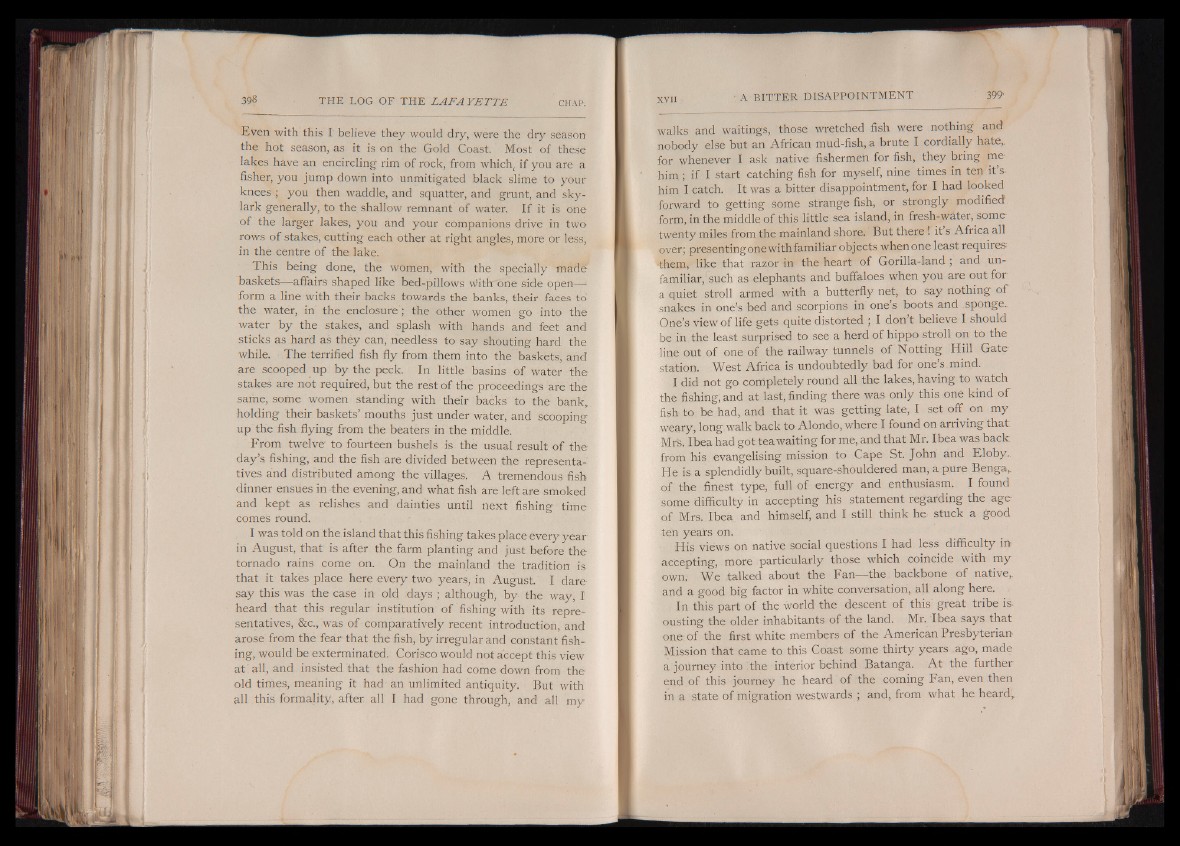
Even with this I believe they would dry, were the dry season
the hot season, as it is on the Gold Coast. Most of these
lakes have an encircling rim of rock, from which, if you are a
fisher, you jump down into unmitigated black slime to your
knees ; you then waddle, and squatter, and grunt, and skylark
generally, to the shallow remnant of water. If it is one
of the larger lakes, you and your companions drive in two
rows of stakes, cutting each other at right angles, more or less,
in the centre of the lake.
This being done, the women, with the specially made
baskets— affairs shaped like bed-pillows with one side open—-
form a line with their backs towards the banks, their faces to
the water, in the enclosure; the other women go into the
water by the stakes, and splash with hands and feet and
sticks as hard as they can, needless to say shouting hard the
while. The terrified fish fly from them into the baskets, and
are scooped up by the peck. In little basins of water the
stakes are not required, but the rest of the proceedings are the
same, some women standing with their backs to the bank,
holding their baskets’ mouths just under water, and scooping
up the fish flying from the beaters in the middle.
From twelve to fourteen bushels is the usual result of the
day’s fishing, and the fish are divided between the representatives
and distributed among the villages. A tremendous fish
dinner ensues in -the evening, and what fish are left are smoked
and kept as relishes and dainties until next fishing time
comes round.
I was told on the island that this fishing takes place every year
in August, that is after the farm planting and just before the
tornado rains come on. On the mainland the tradition is
that it takes place here every two years, in August. I dare
say this was the case in old days ; although, by the way, I
heard that this regular institution of fishing with its representatives,
&c., was of comparatively recent introduction, and
arose from the fear that the fish, by irregular and constant fishing,
would be exterminated. Corisco would not accept this view
a t' all, and insisted that the fashion had come down from the
old times, meaning it had an unlimited antiquity. But with
all this formality, after all I had gone through, and all my
walks and waitings, those wretched fish were nothing and
nobody else but an African mud-fish, a brute I cordially hate,
for whenever I ask native fishermen for fish, they bring me
him ; if I start catching fish for myself, nine times in ten it s-
him I catch. It was a bitter disappointment, for I had looked
forward to getting some strange fish, or strongly modified
form, in the middle of this little sea island, in fresh-water, some
twenty miles from the mainland shore. But there ! it s Africa all
over; presenting one with familiar objects when one least requires:
them, like that razor in the heart of Gorilla-land ; and unfamiliar,
such as elephants and buffaloes when you are out for
a quiet stroll armed with a butterfly net, to say nothing o f
snakes in one’s bed and scorpions in one’s boots and sponge.
One’s view of life gets quite distorted ; I don t believe I should
be in the least surprised to see a herd of hippo stroll on to the
line out of one of the railway tunnels of Notting Hill Gate
station. West Africa is undoubtedly bad for one’s, mind.
I did not go completely round all the lakes, having to watch
the fishing; and at last, finding there was only this one kind o f
fish to be had, and that it was getting late, I set off on my
weary, long walk back to Alondo, where I found on arriving that:
Mrs. Ibea had got tea waiting for me, and that Mr. Ibea was back
from his evangelising mission to Cape St. John and Eloby..
He is a splendidly built, square-shouldered man, a pure Benga,
of the finest type, full of energy and enthusiasm. I found
some difficulty in accepting his statement regarding the age
of Mrs. Ibea and himself, and I still think he stuck a good
ten years on.
His views on native social questions I had less difficulty in.
accepting, more particularly those which coincide with my
own. We talked about the Fan— the backbone of native,
artd a good big factor in white conversation, all along here.
In this part of the world the descent of this great tribe is-
ousting the older inhabitants of the land. Mr. ibea says that
one: of the first white members of the American Presbyterian-
Mission that came to this Coast some thirty years ago, made
a journey into the interior behind Batanga. A t the further
end of this journey he heard of the coming Fan, even then
in a state of migration westwards ; and, from what he heard,